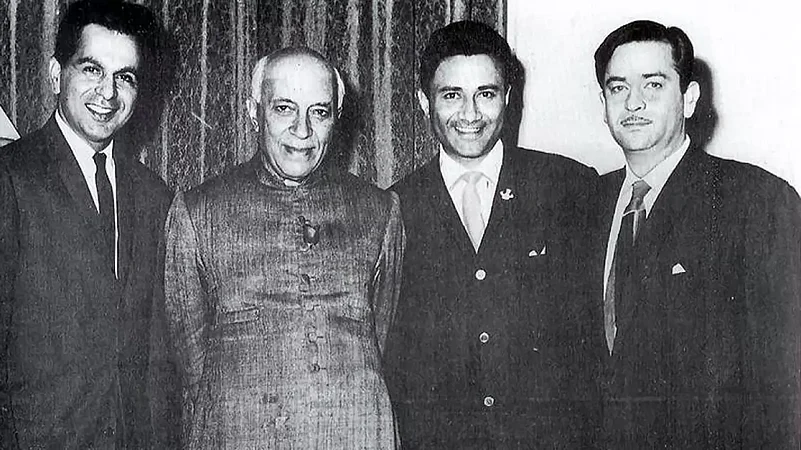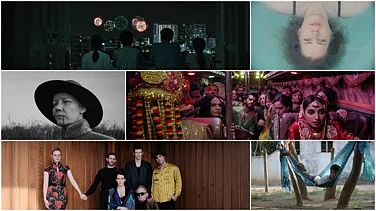‘Politics is not for tender-hearted actors’—this dialogue is not from a Dev Anand movie. The disillusioned actor said this after his brief stint in politics. It is sometimes very difficult to believe that an actor who perfected the art of romance on the silver screen, who, as a ‘Guide’, embraced salvation and said ‘there is no sorrow, no happiness, no world, no universe; no person, no God … there is just me, me, me … just me’, that actor was so inspired by politics that he chose to live two lives—one of an actor and the other of a politician.
Born in 1923, precisely 100 years ago, in the Gurdaspur district of Punjab, Dev Anand was just 20 when he decided to go to Mumbai, the city of his dreams. In July 1943, with Rs 30 in his pocket, he boarded the Frontier Mail train from Lahore Station and reached Mumbai. He had never imagined in his dreams that he would get to revisit Lahore—a city that was now in another country—56 years later, and the special visit would happen at the insistence of the then Prime Ministers of India and Pakistan—Atal Bihari Vajpayee and Nawaz Sharif.
Partition of India happened four years after Dev Anand moved to Mumbai. Fifty-six years later, he received a call from the Prime Minister’s Office and Prime Minister Atal Bihari Vajpayee told him: “Be ready tomorrow. Some officials will visit your place. Please come to Delhi. Yes, do remember to keep your passport. You have to come to Lahore with me. You have many admirers in the neighbouring country as well.”
Before the scheduled bus journey to Lahore, Vajpayee had asked the Pakistani Prime Minister if he wanted something from India. He replied: “If possible, bring Dev Anand along with you.” After this visit, Dev Anand and Sharif were often seen walking and talking in London’s Hyde Park.
London was Dev Anand’s favourite city and Sharif, who had a villa in Hyde Park, would visit London often. According to Mohan Churiwala, who was very close to Dev Anand, Sharif often used to invite Dev Anand for dinner at his villa. He was such a big fan of the actor that he would often enquire about his daily activities. If the actor had hot chocolate at Harrods on a particular day, Sharif would insist on going to Harrods with Dev Anand again.
Narrating an incident, Churiwala says, once Dev Anand was invited to the Sharif residence for dinner. After the meal, Sharif’s wife asked him: “Should I tell Dev saheb about one of your acts?” When Nawaz Sharif asked her not to do so, Churiwala insisted. She said: “We had a CD of CID movie. It has been destroyed by Mian Saheb (Sharif) because whenever the song ‘leke pahla pahle pyar’ would come on screen, Mian Saheb would see a particular still from the song over and over again in slow motion because he loved the way Dev Anand turned in the song.
Not just Sharif, Dev Anand had an admirer in Nehru, too. He had written about an incident in his autobiography Romancing with Life. Around 1947, three film stars were ruling the Hindi film industry—showman Raj Kapoor, tragedy king Dilip Kumar and Dev Anand, the romantic actor who was residing in the hearts of people. First Prime Minister Jawaharlal Nehru once invited all the three actors to his place. Dev Anand wrote in his autobiography:
When we reached his study, Nehru hugged all three of us. He was not keeping well. However, in a short while, his mood changed. Taking advantage of this, Raj Kapoor asked Nehru, “Pandit ji, we have heard that females follow you wherever you go.” Nehru replied with his trademark smile: “I am not as popular as you all are.” Dev Anand then asked: “Your enchanting smile won Lady Mountbatten's heart. Is this true?” Nehru’s face turned red. He enjoyed this question and answered with a smile, “I enjoy these stories about myself.” Dilip sahab intervened: “Lady Mountbatten had herself admitted that you were her weakness.” Nehru laughed and said: “People want me to believe these stories.”
Among the politicians, former Prime Minister, V P Singh was a huge fan of Dev Anand. He took the initiative of asking him to come to Allahabad. Dev Saheb’s autobiography was released at a function there and Singh lovingly remembered that as a child he had the permission to watch only two films (both his) and that his first and last love was Dev Anand’s films. He was close to Defence Minister Krishna Menon, who was in Nehru’s Cabinet. The camaraderie that he shared with Nepal’s King Mahendra was unparalleled. One evening, King Mahendra expressed his desire to have dinner with Dev sahab. Late evening, the chartered flight of the king was at Mumbai’s airport. After having dinner, Dev saheb came back to Mumbai at the crack of dawn.
When Dev sahab was in Delhi for the release of his autobiography, Prime Minister Manmohan Singh mentioned the song from Hum Dono, ‘main zindagi ka saath nibhata chala gaya, har phikr ko dhuen main udata chala gaya.’ He also talked about Guide.
Dev Anand had also discussed Guide with Nehru. After making the movie, he approached Indira Gandhi to get a green signal from the Censor Board. Churiwala, who had accompanied the actor, says that the Censor Board had objected to one scene in which Marco was shown making merry with a woman while working in a cave. The Censor Board wanted this scene to be removed. Both Dev and Vijay Anand were not ready for this. They were of the opinion that it was through this scene that Waheeda Rehman, the heroine of the film, got to point fingers at Marco’s character. After this scene, the heroine comes closer to Raju's guide, the hero of the film, and he gives her a ghunghroo as a gift. This was an important part of the film, which, interestingly was not in R K Narayan’s novel. Dev Anand built his political understanding through this long debate. He requested Indira Gandhi and the then Information and Broadcasting Minister to visit Mumbai and watch the film. She accepted the invitation and a special screening of the film was organised for her. She did not object to the scene and agreed that it took the story forward. The Censor Board passed the movie.
Though Dev Anand was a favourite of the Nehru-Gandhi family, he did not support them when they made the wrong political decisions. When Indira Gandhi declared an Emergency in the country, Dev Anand was not happy. When he was asked to attend a political function of Congress in Delhi, he not only rejected the invitation but refused to praise the Congress government too. As a result, songs from his films were banned from Doordarshan and Vividh Bharti. He publically declared this act of Congress as an act of dictatorship and decided to go to Delhi to lodge a complaint. Once he reached Delhi, he met Information and Broadcasting Minister Vidyacharan Shukla and expressed his anger saying: “Can’t we live the way we want to in a democracy?” When he reached Mumbai from Delhi, many people had gathered at the airport to receive him. Upon seeing so many people around, he asked, “Anything important?” They replied that Doordarshan and Vividh Bharti had lifted the ban imposed on him.
After the Emergency, he launched a political party and named it the National Party of India. The 16-page manifesto stated: “People chose the Janata Party as they were fed up with the dictatorship of Indira Gandhi and they were very disappointed. Now this party is also broken. There is a need for a party that can provide a stable government, a third alternative. The National Party is one such platform where people who think alike can join.”
The membership form had a picture of Dev sahab. At the Taj Hotel, Vijay Anand, V Shantaram, I S Johar, G P Sippi and many other film celebrities joined this party. A decision was taken to contest the Lok Sabha elections. However, people started leaving the party one after the other. Dev Anand realised that he neither had time to prepare for the elections nor any strong contestant who could show the courage to contest the elections. The party failed even before it could take off. Talking to reporters years later, while talking about his failed political dream, Dev Anand said: “Politics is not for tender-hearted actors.”
Even after 100 years, Dev Anand still thrives in the hearts of his admirers. Some of his dialogues are iconic—“Johny does bad work but with sincerity” (Johny Mera Naam) or “Motor is the slave of the rich. Taxi is the food giver for the poor” (Taxi Driver), or “When a woman’s heart breaks, she spends all her life dividing those pieces and when a man’s heart breaks, he spends his whole life reconciling those pieces” (Gambler).
After he passed away, his fans could not see him one last time as his last rites were performed in London. That was his wish; that his fans should not see him after he died but should remember him through his films. Even today, some of his admirers remember his dialogue from Guide which loosely goes like—“Seems like all my wishes will be fulfilled today, but the fun fact is, I don't have any desires left”.
(Punya Prasun Bajpai is a veteran journalist, an author and an annotator)
(Translated By Kaveri Mishra)





















